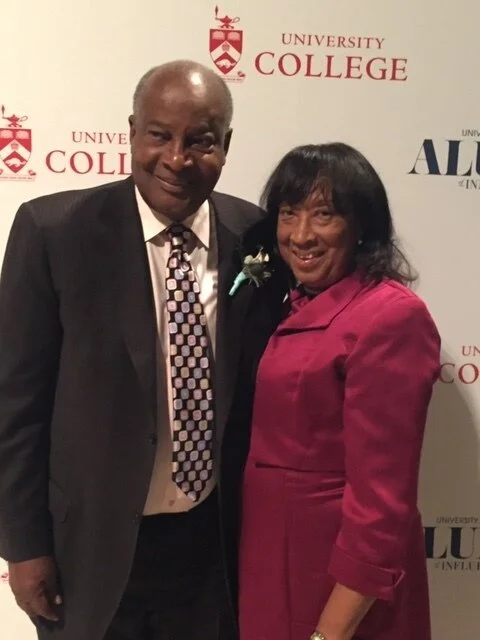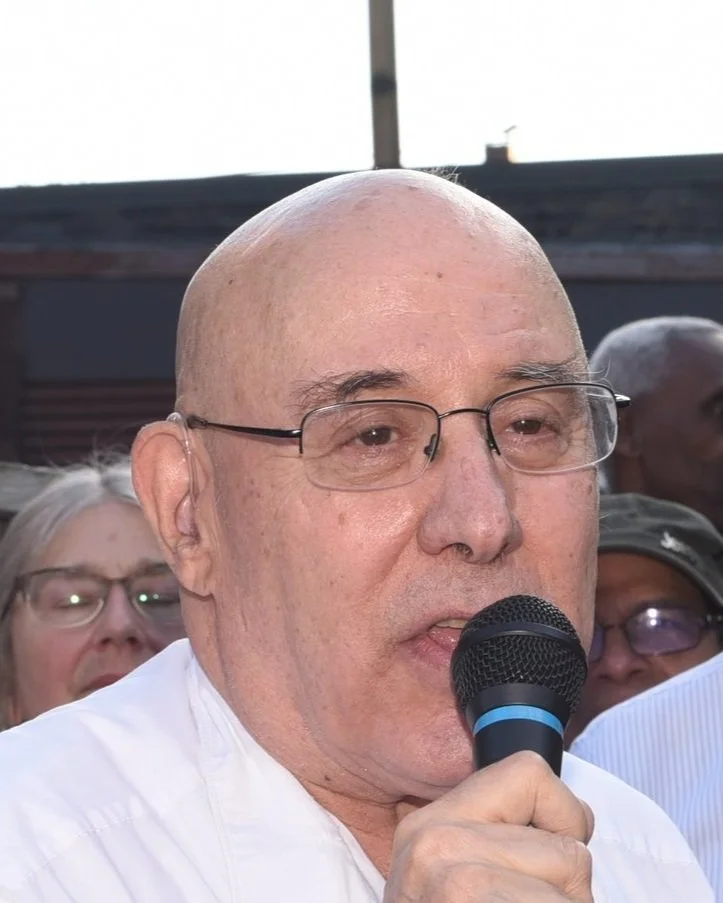Justice Romain Pitt was a man among men
May 21, 2020
While pursuing undergraduate studies at the University of Toronto (U of T) in 2007, Dr. Wendell Adjetey was introduced to Justice Romain Pitt through educator and historian Dr. Sheldon Taylor.
“Elders in the Black community had organized a dinner for Roy McMurtry (former Ontario Chief Justice) and I didn’t have $100 to obtain a ticket for the black tie event,” recalled the McGill University Assistant Professor. “Dr. Taylor informed the judge who in turn purchased my ticket having never met or spoken with me. His generosity moved me deeply, so I made an effort to show him through word and deed that I was grateful that he would take an interest in a nobody like myself.”
The first Black lawyer appointed to the Ontario Superior of Justice from private practice in the province died a few hours after falling in his home on April 29.
He was 84.
Pitt’s death moved Adjetey to tears.
“I admired and adored him,” the first Ghanaian-born to matriculate from Yale University with a PhD in History said. “I quickly discerned that he was a man who truly had a heart for young people. He encouraged me to serve the youth in our community and to make the most of my blessings. He wasn’t just an elder. He was a dear friend since 2007 and we often discussed life matters, politics, economics and history. He always managed to sneak in a reference or two about his beloved wife, his children, grandchildren and, of course, cricket. Those who know me ask why I walk around with a chip on my shoulder. It is because of elders like Justice Pitt who not only accomplished the unimaginable when Canadian society denied Black folks opportunities to self actualize, but used their success to make life better for other Blacks and minorities.”
Pitt’s intellectual prowess, understanding of the law and generosity struck a chord with Taylor.
“He was also able to be effective behind the scenes because he had a lot of connections and could pick up the phone and reach out to them,” he pointed out. “Like any good Caribbean person, Romain had many different personas which was a good thing because he could walk down different roads of life. He was down-to-earth and you could shoot the breeze with him and leave learning quite a lot.”
Born in Grenada, Pitt migrated to Canada in 1954 and graduated five years later with a Bachelor of Arts in Economics from the U of T that honoured him in 2015 with a University College Alumni of Influence Award.
Called to the Ontario Bar two years after finishing law school in 1963, he articled and worked as a lawyer at Blaney Pasternak on Bay St. prior to forming, with Eric Lindsay, the first Black partnership of lawyers in Canada that lasted nearly a decade.
A sole practitioner for 16 years, Pitt partnered with Victor Burke for two years before his historic appointment to the province’s Superior Court of Justice. He was the nephew of B.J Spencer-Pitt, Ontario’s fifth Black lawyer, who mentored youths and provided free legal service to members of the Black community.
Court of Appeal for Ontario Judge Michael Tulloch served with Pitt on the Superior Court of Justice for seven years until 2010.
“During that time, we became friends and he was always just a phone call away,” he said. “Romain was a great inspiration, stalwart and mentor to my generation of Black lawyers and judges and we will forever owe him a great deal of gratitude for helping to lay the foundation and paving the way so that we can now benefit from the path that he paved.
“He was a pillar of strength both within the Black community as well as the legal community at large. He was always generous to share his wisdom and his voice of reason both through his judgments, while speaking to young lawyers who he would often mentor and, after his retirement from the Bench, in newspaper articles and opinion pieces.”
Pitt and his wife Amabelle
Supreme Court of Canada Judge Michael Moldaver said Pitt was admired and respected by members of the legal profession and his judiciary colleagues.
“Romain represented everything one thinks of when asked to define the ideal judge,” said Moldaver. “He was thoughtful, patient, courteous and sensitive. He could be firm when necessary, but he was never belligerent or rude to counsel. He had a wonderful working knowledge of the law and a deep understanding of the human condition…Moreover, he was a great Canadian who contributed to his country in so many ways, including the many good and charitable causes he supported.”
Retired Senior Court Judge Greg Regis noted that Pitt’s appointment to the Bench uplifted the Black community.
“When he was appointed a Judge in 1994, I recall the Black community in the Greater Toronto Area was feeling down because of the negative media coverage associated with the ‘Just Desserts’ fatal shooting,” said Regis. “Many of us saw his appointment as an opportunity to change the focus as we now had a positive story coming from our community. Romain didn’t disappoint us. I knew him since 1975 and he was always kind to me. During my time as a law student, he would call from time to time to check on me and offer words of encouragement. He was an all-round fine person.”
Superior Court judge and author Dr. Irving Andre said Pitt was an excellent and highly respected jurist and a consummate gentleman.
“When I was appointed to the Bench in 2002, he took the time to send me a congratulatory letter despite the fact that he didn’t know me personally,” Andre noted. “As far back as 1971, he also supported the struggle for justice in Dominica by making a financial contribution to free late Black activist and future Prime Minister Roosevelt Douglas after he was convicted in April 1971. Our community has lost a giant of a man and we are all richer for knowing him.”
Pitt and his grandson Michael
Active in the community, Pitt served on the boards of the Art Gallery of Ontario, Toronto General Hospital and the Church Council of Justice & Corrections and helped establish the Sickle Cell Association of Ontario and Black Business & Professional Association.
“As a co-founder and former president of the BBPA, I am grateful for the vital role Romain played in the crucial early years of the organization,” Cynthia Reyes said. “The founders were a group of smart and opinionated individuals who cared passionately for the betterment of our community and had varying views on the focus and identity of the new organization. Some of the founders and supporters wanted a sort of investment club geared towards helping members make money, thereby building greater wealth, while some wanted to carry out charitable/not for profit initiatives. Many, however, wanted to do both. We soon realized that we could not do both in a single organization.
“His crucial questions and advice helped the founders to define our focus as an organization. He was the lawyer who helped us to register the organization and adopt a constitution with bylaws. We were indeed fortunate and blessed to have had such a knowledgeable and caring lawyer who understood our community, cared for its advancement and was patient enough to guide us through those challenging early years.”
Pitt was also a founding director of the Toronto Caribbean Carnival which honoured him in 1984 with the Caribana Award for Cultural Contribution Community Development & Awareness.
“As a member of the Caribana board, he helped to mould the organization into what it became though he always maintained that the impact of the festival to the community was never fully financially recognized,” said former Cricket Canada General Secretary Calvin Clarke. “He was an ardent cricket fan and a walking library when it came to sport.”
Former Ontario Deputy Minister Joe Halstead met Pitt through late trade unionist and human rights activist Bromley Armstrong.
“I was looking for a lawyer at the time and Bromley took me by bus to meet him in his Bathurst St. office,” recounted the ex-Toronto Caribbean Carnival Chair. “I was struck then and remained in awe whenever I came into contact with him. A fine gentleman in the true sense of the word, I am sure that there are many legacies that we associate with Romain. But from a community perspective, the one I think is the most lasting is that he was one of the founding fathers of Caribana which is now the Toronto Caribbean Festival.”
Entrepreneur and BBPA co-founder Denham Jolly and Pitt were close friends for over six decades.
They spoke the night before he died.
“We partied together, travelled together and gave valuable support to each other over the years,” added Jolly. “He was my legal and personal counsel and we spoke daily. His contributions to the Black community, Toronto and Canada are historic and myriad.”
Pitt died four days after his son-in-law
Pitt is survived by his wife of 56 years – Amabelle – and children Jennifer, whose husband succumbed to a massive heart attack four days before her dad died, Kevin and Tracy.
“Our father had a great sense of humour and was extremely family-oriented, a social justice warrior and an avid sports fan,” said his son. “He instilled in me and my sisters that hard work and a good education are essential. He drilled that into us at an early age. When he was appointed to the Bench, that was the proudest day of my life.”
One of eight siblings, Pitt was predeceased by a sister and four brothers, including anti-apartheid activist and medical practitioner David Pitt (Baron Pitt of Hampstead) who was the first Black parliamentary candidate in Britain in 1959 and the second peer of African descent to sit in the House of Lords before succumbing to cancer in 1994 at age 81.
A celebration of Pitt’s life will be held in the future. Donations in his memory can be made to the Toronto General Hospital.









